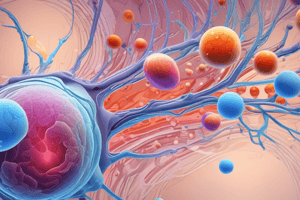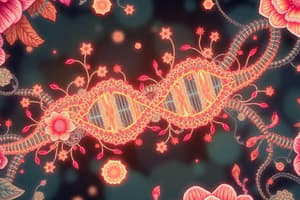Podcast
Questions and Answers
What do cell surface receptors and their ligands mediate?
What do cell surface receptors and their ligands mediate?
Signal transduction in cells.
What regulates gene expression to specify different cells?
What regulates gene expression to specify different cells?
Transcription factors.
What mechanism influences the development of neighboring cells?
What mechanism influences the development of neighboring cells?
Induction.
Cells in multicellular organisms communicate by responding to which of the following?
Cells in multicellular organisms communicate by responding to which of the following?
Individual cells require only one signal to survive.
Individual cells require only one signal to survive.
What can lead to cell death?
What can lead to cell death?
What affects the speed of a cellular response?
What affects the speed of a cellular response?
What are the major classes of cell-surface receptor proteins?
What are the major classes of cell-surface receptor proteins?
What process occurs at activated receptors involving intracellular signaling complexes?
What process occurs at activated receptors involving intracellular signaling complexes?
Activated Receptor Tyrosine Kinases (RTKs) phosphorylate themselves and bind to ______.
Activated Receptor Tyrosine Kinases (RTKs) phosphorylate themselves and bind to ______.
What is Liquid-liquid phase separation (LLPS) related to in the context of receptor signaling?
What is Liquid-liquid phase separation (LLPS) related to in the context of receptor signaling?
Flashcards are hidden until you start studying
Study Notes
Extracellular Signals
- Cell surface receptors interact with ligands, like growth factors, to mediate signal transduction.
- Communication among cells in multicellular organisms primarily occurs through extracellular signaling molecules and cell-cell contact.
- Accommodation of cell responses often requires multiple extracellular signals for survival, growth, division, and differentiation.
Transcription Factors
- Proteins that regulate gene expression, guiding the specification of different cell types and functions.
- Early development relies on maternal transcription factors, while later stages are influenced by extracellular signals.
Induction Mechanism
- Refers to the process where one cell population influences the development of neighboring cells, crucial for differentiation in tissues.
Cell Response Mechanism
- Cells can adjust their sensitivity to signals through protein trafficking, phosphorylation, and ubiquitination processes.
- Activation of receptor tyrosine kinases (RTKs) involves autophosphorylation and the binding of SH2 domain proteins.
Signalling Distance and Types
- Extracellular signals can act over short or long distances, affecting cellular behavior depending on the signaling context.
- There are three main types of cell-surface receptor proteins involved in signal transduction.
Intracellular Signaling Complexes
- Forming at activated receptors allows for specific and precise signal relay in a crowded cytoplasm.
- Response speed to signals is influenced by the turnover rate of signaling molecules, with mechanisms for positive and negative feedback.
Liquid-Liquid Phase Separation (LLPS)
- LLPS is a phenomenon aiding in the organization of signaling complexes at the plasma membrane, allowing weak and transient protein interactions.
- Upon activation, RTKs bind ligands, undergo autophosphorylation, and facilitate recruitment of signaling proteins, ultimately forming signaling droplets through LLPS.
Receptor Tyrosine Kinase (RTK) Dynamics
- RTKs, such as FGF receptors, illustrate the process of receptor signaling and the role of phase separation in enhancing signal transduction and drug targeting.
- The range of proteins involved in signaling cascades varies depending on the cell state and the ongoing signaling cascades.
Studying That Suits You
Use AI to generate personalized quizzes and flashcards to suit your learning preferences.




